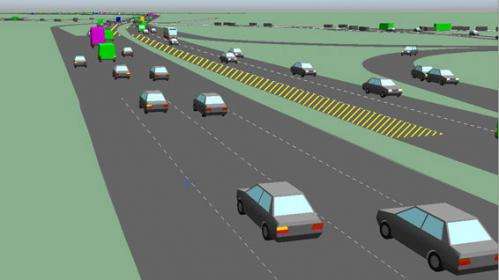Overly polite drivers, not roadworks, cause traffic jams

British motorists who are too polite or timid in their driving style are the cause of lengthy traffic jams across the UK, particularly when faced with roadworks or lane closures, according to a leading Heriot-Watt research scientist who found traffic jams can be up to 20 per cent worse than engineers plan for, due to drivers being overly polite on the road.
Dr Guy Walker, Associate Professor in Human Factors with Heriot-Watt's Institute for Infrastructure and Environment, has been working with the Scottish Road Research Board and SIAS Transport Planners Ltd, the UK's foremost traffic microsimulation company, carrying out complex research into driver behaviour to find novel and innovative solutions to major traffic jams. He says that big traffic problems are caused by small actions from individual drivers.
"My research found that the majority of drivers, when confronted with roadworks ahead, quickly move into the nearside lane as early as possible rather than merge at the forefront of the queue. No one wants to be seen by fellow drivers as the type of person who pushes in. This behaviour however leads to the loss of a further lane of capacity, that's in addition to the ones already closed because of roadworks."
It costs about £30 million to build a mile of motorway and about £40,000 per year to maintain it, but driver's reluctance to push in means this expensive resource is not being used.
Dr Walker addes, "People are self-conscious, if everyone else is merging early you become extremely reluctant to do something different, even if a big sign at the side of the road is telling you to. Behaviours like these are contagious, which is why people merge into the inside lane earlier and earlier, making congestion, anxiety and frustration worse."
Simple solutions
To reduce the amount of time spent queuing and in turn reduce the stress levels of drivers, Dr Walker suggests simple yet novel solutions taken from an unlikely source, the amusement industry. The psychology of queueing is used to good effect here, and the same ideas could make drastic positive changes to the road network as well.
He said, "One extreme solution is to build more lanes. Unfortunately, it costs millions to build a mile of motorway, and even more to maintain it, and if drivers aren't using this expensive resource because we object to pushing-in, then we have a problem. The good news is that we don't necessarily need lots of big expensive engineering to regain the lost lane of capacity. Instead we can use small, clever and highly cost-effective solutions."
Dr Walker suggests adopting some of the techniques used at theme parks. One example is where popular rides provide an estimated wait time when a person joins a queue. If they arrive at the front of the queue quicker than the time they were given, they are less likely to become angry at the amount of time spent waiting, according to Dr Walker.
"In fact, research shows people who arrive at the front of a queue more quickly than expected are the happiest of all. There are lots of clever ways we can help to reduce driver's anxiety while queueing and make waiting times seem shorter than they really are. Instead of signs saying 'stay in lane 'what about 'drivers ahead don't mind you pushing in'?"
Provided by Heriot-Watt University


















